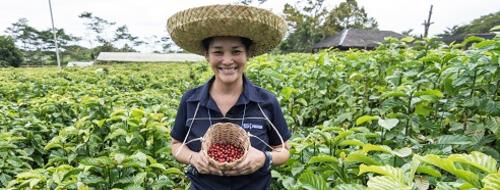The Food and Nutrition Research Institute of the Department of Science and Technology (FNRI-DOST) recently held the 44th FNRI Seminar Series of Food and Nutrition Researches and Science and Technology Activities, with the theme “Generating Sustainable Food Resources for Food Security, Optimum Nutrition and Wellness (GROW).”
During the series, two Nestlé scientists presented large-scale dietary studies based on the analyses of local nutrition survey results in cooperation with FNRI to understand nutrient intakes and identify nutrient gaps in the diet of Filipinos. The two are Dr. Liya Denney, a senior research scientist in the Institute of Nutritional Science of the Nestle Research Centre (NRC) in Lausanne, Switzerland, and Dr. Ye Sun, associate nutrition epidemiologist at Nestlé Research Center Asia in Singapore. Their studies were completed in collaboration with Dr. Mario Capanzana, FNRI Director, and Dr. Imelda Agdeppa, FNRI Assistant Scientist and Head of the Nutritional Assessment and Monitoring Division.
Dr. Denney’s study is titled “Usual energy and nutrition intakes and food sources of preschool and school-aged children in the Philippines.” The study found that the diet of Filipino children is made up of few foods (low food variety) with large amounts of refined rice and sweet bakery products, while nutrient-dense foods (milk, vegetables, fruits and meats) played a little role. This leads to large shortfalls in many key nutrients.
More intakes of nutrient dense-foods would improve the diet significantly. The economic status of families has strong effects on nutrient intakes; the poorer the family the higher the inadequacy. Among children from rich families, there is over-consumption of energy and fat.
The results of the study could be used for developing public strategies to improve diet quality and address nutrient gaps in the diets of Filipino preschool and school-aged children.
Dr. Ye’s study is titled “What and how well are Filipino adults eating?” The disease burden landscape in the country has changed from 1990 to 2010, shifting from communicable to non-communicable diseases. Dietary risk has become the number one leading risk factor for the burden of disease in the Philippines.
The study said the dietary pattern of Filipino adults shows a carbohydrates-dominant diet, and food intake gaps exist for nutrient-dense foods including dairy, eggs, vegetables and fruits. For breakfast, vitamin C-rich foods such as fruits should be consumed. For snacks, foods high in sugar and sodium should be controlled, while foods rich in or fortified with protein, niacin, vitamin B12, phosphorus, and vitamin D should be encouraged.
More than 50% of adults and seniors were found to have seven to nine key nutrients not meeting intake recommendations. Nutrient intake inadequacy could be associated with various health risks. Major food sources of key nutrients include meat, fish, vegetables, fruits, grains, dairy, beans and nuts, suggesting the importance of a diverse and balanced diet. Encouraging intake of nutrient-dense foods with good bioavailability, including dairy, fruits, and vegetables, could help to fill the nutritional gap.
